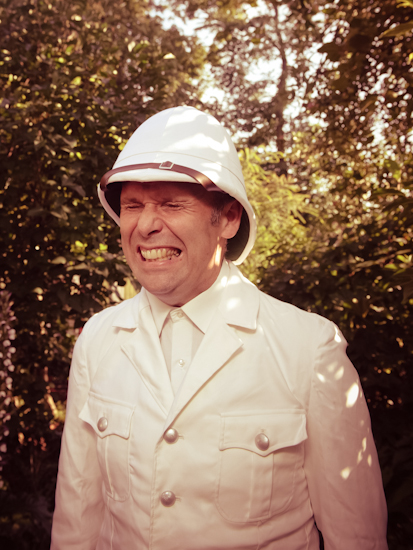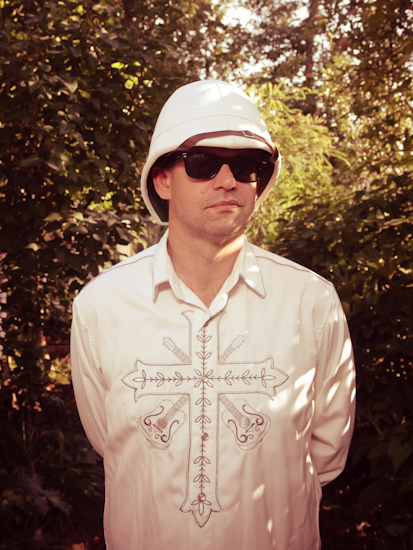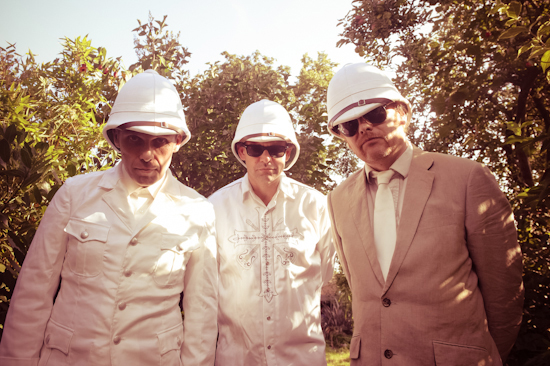Everything you know is wrong. This is the message being brought to you by Luke Haines – heretofore known as the dissolute “sick man” of Britpop’s imperial hubris – and the notorious papal defiler and honey-throated left-wing demagogue, Cathal Coughlan. Having been brought together by inky hack and occasional Quietus contributor Andrew Mueller, these two long-term recidivists in the field of musical mischief now stand revealed, not as desperate rogues but as wild-eyed prophets – seers, if you will – in possession of ancient truth-telling documents, long rumoured to exist but never unearthed until now: The North Sea Scrolls.
"They were given to us by the actor Tony Allen, who found them in a bin outside Waitrose," Haines announces portentously. "Sadly, Tony is no longer with us. But he handed the scrolls on to us, and we’ve handed them on to the British Museum." But not before Haines, Coughlan and Mueller painstakingly decoded these arcane manuscripts, distilling their revelations into the most potent method of communication available – the medium of song.
What the Scrolls apparently tell us is that history is very different to what we have all previously believed. Who would have thought, for instance, that far from continually suffering under English oppression, Ireland actually successfully invaded and conquered Britain in 1948, dividing her four years later into just two counties, Northshire and Southshire? Or that Sir Oswald Mosley led two successive British governments as the nation’s Lord Protector in the 1960s? Or that Van Der Graaf Generator emerged victorious on Opportunity Knocks in 1974? These are the kind of earth-shattering epiphanies that will be fully unveiled over the course of two three-hour shows at Edinburgh’s Cabaret Voltaire on August 22nd and 23rd, as part of this year’s Edge Festival. Comparisons could be made, perhaps, with the Illuminatus! Trilogy of Robert Anton Wilson, but when I put this to Haines, Coughlan and Mueller, all three insist that they are in no way conspiracy theorists.
Coughlan: I think the fuck up theory of history is always greater and more persuasive than the conspiracy theory of history. If we had to have a parallel made with the illuminati, it would be: we are the illuminati of the fuck-up theory.
Haines: I think there’s more truth to this.
Mueller: There is a song later in the programme that does mention Jim Corr, of the Corrs, who has a certain interest in these things…
Where does he come into it?
Mueller: He doesn’t, as far as we can see. It’s just gratuitous abuse, I think.
Coughlan: Well, to be fair, he does attempt to persuade the retired IRA to dig up a great deal of South Armagh because he feels that Shergar, the Twin Towers and various other things are buried there.
Haines: But essentially, the scrolls laugh in Jim Corr’s face, really, one would have to conclude.
Coughlan: Yeah. But it is good that we’re playing in Edinburgh the same night as one of his sisters.
Haines: We’re playing the same night as Gomez, as well.
Mueller: It’s all coming together.
Coughlan: It’s almost as if there’s a hidden hand in there…

Ah yes; Gomez. Former labelmates of Haines on the now-defunct Hut Records, still going apparently despite their career seemingly peaking when their debut album scooped the Mercury back in 1998, their singer-guitarist Ian Ball just happens to share his name with the hapless petty thief who attempted to kidnap Princess Anne in 1974. Coincidence? In the world of the North Sea Scrolls, there’s no such thing. After following mysterious instructions to an obscure location somewhere in the Far East (Leytonstone, I believe), I’m blindfolded and led into a secret chamber, where Coughlan and Haines perform four of the fourteen songs they’ve crafted from the raw material of the Scrolls. The first of these is entitled ‘Broadmoor Blues Delta’, and relates how, many years into his subsequent residency at the titular high security psychiatric hospital, the failed kidnapper Ball was approached by The Devil himself. In a rattle of gold chains and a cloud of sulphurous cigar smoke, this oddly familiar northern Lucifer "fixed it" for Ball to swap places with his namesake in the then-high-riding indie-rock band.
Another song, Cathal Coughlan’s ‘Mr Cynthia’, concerns how Mosley’s Minister of Culture, Sir Joseph Meek, placed the troublesome upstart pop star John Lennon under house arrest in the mid-60s, for fear that his ill-considered views on politics, religion and the like could unduly influence the nation’s youth. Protesting something or other from the inside of a purple burlap bag at the time, Lennon failed to notice that he was effectively exiled to his Weybridge Mansion, and continued to compose increasingly turgid ballads at his gold piano, while carefully vetted friends were allowed occasional visits. With Lennon all but forgotten by the outside world, his former wife Cynthia blossomed into a celebrated pundit of “blank common sense.” Can this be the way things really were?

Coughlan: Well, she did for a time in the 1980s essay a certain interest in political matters, which was markedly different to that adopted by her then-deceased ex-husband. And I just kind of thought, what if that had won the day, rather than… Well, actually, the view of things that she had is the one that won the day ultimately! But what if she was an icon for it… I mean, I must say that something that was running through my head, when thinking about the Scrolls earlier, is that much is made of the scars on the British psyche of Empire, but I think it’s just as instructive to look at the damage that’s been done by industrialisation, strange retellings of history, a bizarre approach to education, things of that nature… it’s not just all about post-Empire. My own country of origin, similarly, it’s not just about having been oppressed for eight hundred years or anything like that, it’s also about believing tall tales about your cultural importance to the whole English-speaking world, especially the United States, you know, there is an arrogance that comes of that, just as there is a sense of inferiority that is present in Britain. I’m getting a bit serious here, so we’d better move on…
Mueller: No, I do like that whole idea. And briefly retrieving my rock critic’s hat, the reason that I thought Cathal and Luke would be quite a creative pairing is that both their songs have always exhibited a certain difficulty with received wisdoms. And that’s what I really liked about ‘Mr Cynthia’. Because you’re right, John Lennon has become this absolutely untouchable icon, whereas I for one would maintain that ‘Imagine’ was actually the worst song ever written.
Coughlan: He was not a man without qualities, but it’s a wide gaping goalmouth for taking the piss. And of course his Irish antecedence gives it a certain resonance.
And we’ve got Joe Meek as Minister of Culture, under Mosley…
Coughlan: Well, the drum solo on ‘Have I the Right’… (Smacks fist into hand to a martial, stamping beat)…
Haines: That’s all you need.
Coughlan: I mean, he was the English James Brown, wasn’t he?
Haines: Meek was also kind of interesting because his career was lost at the point that rock n’ roll discovered mysticism. Even though he was a rampant occultist, he didn’t want anything to do with exotic mysticism. That pretty much did for him, and in a weird way that kind of sounded the death knell for the 60s, when you got into that business. Because the Beatles didn’t really make a good record after Beatlemania; once they’d discovered sitars it was all over, really. I think most people would agree with that.
Mueller: A couple of decent tunes on Revolver?
Haines: Nah.
Coughlan: Once Pete Best had gone…
Haines: Well, yeah, you know, the Hamburg days were the best, when they were dressed as Reeperbahn rent boys. That was the best look.
The Scrolls also reveal how, prior to being made Minister of Culture, Meek almost single-handedly broke the 1962 Miner’s Strike.
Coughlan: He would have gathered a militia and marched on Sheffield. An army of Morris Men, led by Heinz…
Mueller: The Morris Men do feature later in the North Sea Scrolls, as a kind of rural Cotswolds thugee cult.
Haines: It is feasible that there could have been a kind of beat band Morris troupe. There was a psychedelic Hell’s Angel Morris troupe, called the Blackheath Foot and Death Men…
Mueller: I bet they threw a great Christmas party.

Later on, the song ‘I’m Not The Man I Am’ goes in greater depth into the career of the enigmatic Tony Allen, a bit-part actor known, if at all, for small roles in The Sweeney and Minder. A key figure in the revelations, Allen was actually, according to Haines, a kind of Zelig figure moving imperceptibly through the hidden weave of history: the secret lover of Sid James, a patient of radical psychiatrist RD Laing, the catalyst behind Peter Green’s long periods of inactivity and, ultimately, the John the Baptist of the North Sea Scrolls.
Mueller: Which would make Sid James the Salome figure of the whole thing…
Haines: He does crop up at various points in the narrative, yes. There’s a certain cabal of people who would claim that Tony Allen perpetrated all of the works of Francis Bacon; that he took many more Screaming Popes with him, when he died. Topolski was another artist who Tony Allen, to all intents and purposes, was.
(When later research on my part suggests that the actor Tony Allen is actually still alive, and living in quiet retirement, Haines responds swiftly with a helpful email, saying “Nope, Tony Allen is dead. Tony Allen the bit part actor may be alive and well, but the real Tony Allen – the one who was actually Bacon, Topolski, Bratby, Sid James’s lover, and Kent’s foremost fan of Dean Parish etc.- was found dead in a bedsit in Bexhill On Sea in 2004. Having drunk twice his weight in seawater. There are of course rumours that he has been seen since: once in West Africa and seventeen times in Maidenhead. Hope this clarifies everything.”)
Another figure that recurs throughout the Scrolls is Dublin crime boss Martin Cahill.
Coughlan: Martin Cahill will be familiar to a lot of people from the Hollywood movies that were made of his criminal career in Dublin, but we’ve taken the view that rather than being nicknamed ‘The General’, he actually was a general in the Irish Imperial Army, and the Papal Nuncio cum Vice-Regal figure in occupied Whitehall circa 1948, or thereabouts.
Mueller: The Irish Mountbatten, in fact.
Coughlan: Yeah, very much so. I don’t know if his missus was carrying on with any of the English Liberation Army or not, which would be necessary to establish the whole thing, but…
So what are some of the other themes that you’ve dealt with in the songs?
Coughlan: There’s one about the transporting of the Scrolls from Ladbroke Grove to Norfolk, by Hawkwind in a balloon…
Mueller: There’s a quite startling revelation about the truth behind the guttering troubles in Northern Ireland. We do actually name the guilty men, and it’s not necessarily who people assume it is.
Coughlan: It’s an Australian tribute act, basically, doing All Tomorrow’s Parties type revivals of the Enniskillen killings…
Mueller: In much the same way as those versions of Motown groups who carry on touring despite the fact that all the original members are dead.
Coughlan: My Mother, My Dead Mother?
Haines: Oh yeah, that’s about the last Royal Wedding, which was actually a strange Oedipal rite, with the deposed Royal Family dwindling into obscurity, living in a kind of Grey Gardens existence, where William’s the mother and he’s marrying his dead mother, which is Diana. So we’ve covered that.
Coughlan: Like any good show should, really. And the Seven Funerals, which describes the seven-day ritual that will attend the death of Sir James – not that we wish this to occur for many a long year.
Mueller: Especially not the week before we open.
Coughlan: Indeed not. But various scenarios are enacted, such as a tag team wrestling bout with three dead wrestlers, and Sir James’s dead body suspended from the ceiling, swinging along, pretending to do a tag team bout.
Haines: And the death of the other popular DJ, Chris Evans, being burnt at the stake, where he’s having a reverie that he’s Falconetti from Carl Dreyer’s Passion of Joan of Arc. Because in the Scrolls, Evans is obviously a seer and a visionary, not the cunt we think he is. This Chris Evans is a wise man who has knowledge; people are unsure, but he has things that other people don’t know. Only Evans is privy. He becomes a master, and he’s eventually fast-tracked to canonisation.
Mueller: Is he a catholic?
Haines: Oh, I’ve no idea. Hopefully. It would help.
So he’s one of the good guys, really?
Haines: Absolutely. He’s a wise man. If it weren’t for the scrolls we would have all been misled about Evans.
Coughlan: Focussed on the sin rather than the inspiration and the sheer importance of the man.
So they’re topical songs about topics that most people are completely unaware of. You’re like the Barron Knights of an alternative universe, really, aren’t you?
Mueller: Or the Wurzels.
Coughlan: We’ll accept either, really.
And are there any plans for more shows, or to make a record?
Haines: I think we’ll definitely do it again. I think we’re talking about some dates in Dublin… are we?
Coughlan: Dublin, Cork and something in the Home Counties, I think.
Mueller: Something in London or the Home Counties. And I for one, as a long-term fan of both Luke and Cathal’s songwriting, think it would be a shame not to make a record of these songs, which I think are way up there. And there are still scrolls yet to be properly examined…
Haines: We’re awaiting the return of the balloon, with Hawkwind.
Mueller: Yes, as soon as Hawkwind return in their balloon…
Haines: I think they’re over Westbourne Park at the moment…
Mueller: Waiting for the return of Hawkwind’s balloon, I think, is very much where we’re at. And aren’t we all?
For more information about the North Sea Scrolls at the Edinburgh Fringe, go here. For Al Overdrive’s photography, please visit his website.


